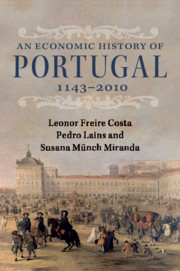Book contents
- Frontmatter
- Contents
- List of figures
- List of maps
- List of tables
- Preface
- Introduction
- 1 The medieval economy, 1143–1500
- 2 The age of globalization, 1500–1620
- 3 War and recovery, 1620–1703
- 4 The Atlantic economy, 1703–1807
- 5 The rise of liberalism, 1807–1914
- 6 Patterns of convergence, 1914–2010
- Conclusion
- References
- Index
Introduction
Published online by Cambridge University Press: 05 May 2016
- Frontmatter
- Contents
- List of figures
- List of maps
- List of tables
- Preface
- Introduction
- 1 The medieval economy, 1143–1500
- 2 The age of globalization, 1500–1620
- 3 War and recovery, 1620–1703
- 4 The Atlantic economy, 1703–1807
- 5 The rise of liberalism, 1807–1914
- 6 Patterns of convergence, 1914–2010
- Conclusion
- References
- Index
Summary
This book is about the evolution of the Portuguese economy during the course of eight centuries, from the foundation of the kingdom, in 1143, when political boundaries began to take shape in the midst of the Christian Reconquista of the Iberian Peninsula, to the integration of the nation in the European Communities and the Economic and Monetary Union. While the economy we are interested in responded to external influences across the land and sea borders, its activity also exerted influence on events occurring elsewhere.
The study of the Portuguese economy highlights in a vivid way a number of aspects of European economic history. Indeed, the formation of Portugal as a political unit in 1143 should be seen as part of the broader movement in the Iberian Peninsula, called Reconquista, which obtained the statute of Crusade by papal encyclical in 1123. The understanding of the economic forces driving territorial expansion, which ended with the takeover of the Algarve, in 1249, presents a rare opportunity to observe how Christian rulers and settlers managed to conquer and reorganize resources that were once inserted in the Muslim al-Andalus, by then one of the more urbanized and possibly technologically more advanced areas of southern Europe. The Reconquista of the Iberian Peninsula spanned 781 years, since the fall of Granada took place in 1491, and thus contributed to expand Europe's cultural, religious, and economic borders while establishing the political and institutional framework of the new Christian kingdom.
Regarding this particular aspect of the first century of Portuguese history, the development of manorial organization in Iberia provides additional evidence for a comparison with the seigneurial regime as it evolved elsewhere in Europe. The rise of a stable and legitimized monarchy in the twelfth century went hand in hand with the distribution of land and wealth that defined the balance of power between the king, the nobility, and the Church. This equilibrium needed regular military actions to ensure its sustainability and was accompanied by a dynamic of territorial expansion in order to secure more resources to be distributed. These factors were also the main drivers of the overseas expansion, beginning with the conquest of Ceuta in the northern coast of Africa, in 1415, and the ensuing discoveries. The Reconquista and maritime expansion were thus closely linked in their institutional, military, and economic aspects.
- Type
- Chapter
- Information
- An Economic History of Portugal, 1143–2010 , pp. 1 - 13Publisher: Cambridge University PressPrint publication year: 2016



